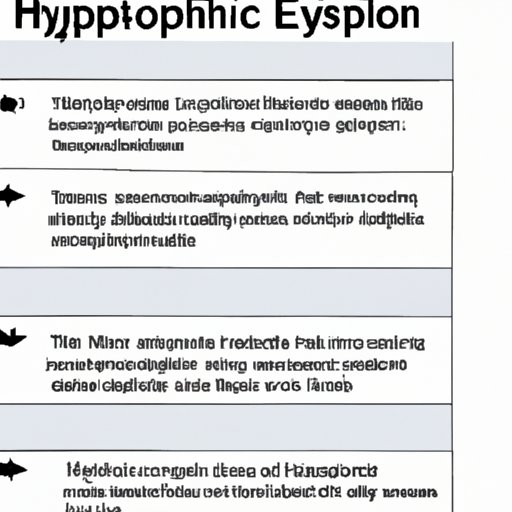Introduction
A hypothesis is a statement that can be tested and is used as a starting point for scientific research. It is an educated guess about a certain phenomenon based on observation and background research. A hypothesis must be testable and falsifiable, meaning it can be disproved by evidence. Writing a hypothesis in science can be a challenging task, but it is essential for conducting effective research. In order to write a good hypothesis, it is important to understand what a hypothesis is and what makes a good one.
Outlining the Steps for Writing a Hypothesis in Science
Writing a hypothesis in science requires careful research and thoughtful consideration of the variables involved. There are five main steps involved in writing a hypothesis in science: choosing a topic, researching the topic, formulating a question, making an educated guess, and formulating a hypothesis.
Step 1: Choose a Topic
The first step in writing a hypothesis in science is to choose a topic. The topic should be something that interests you and that has enough data available to draw reliable conclusions from. It should also be relevant to your field of study. Once you have chosen a topic, you can begin doing background research to gain more knowledge about it.
Step 2: Research the Topic
The second step in writing a hypothesis in science is to research the topic thoroughly. Gather information from books, articles, and other sources to gain a better understanding of the subject matter. Make sure to take notes and document all sources used so that you can cite them correctly later.
Step 3: Formulate a Question
The third step in writing a hypothesis in science is to formulate a question. This question should be specific and directly related to the topic you are researching. Brainstorm possible questions and narrow them down until you have one that is both interesting and testable.
Step 4: Make an Educated Guess
The fourth step in writing a hypothesis in science is to make an educated guess about your question. This guess should be based on the research you have done and should take into account any potential variables that may affect the outcome. Your educated guess will become the basis for your hypothesis.
Step 5: Formulate a Hypothesis
The fifth and final step in writing a hypothesis in science is to formulate the hypothesis. This should be a clear statement that can be tested and verified. It should include the independent and dependent variables and state the expected outcome. Once the hypothesis is formulated, you can begin testing it.
Explaining What a Hypothesis Is and How It Differs From a Theory
In order to understand what a hypothesis is and how it differs from a theory, it is important to first define each term. A hypothesis is an educated guess or statement that can be tested through experimentation or observation. A theory, on the other hand, is an explanation of a phenomenon or set of phenomena based on existing scientific knowledge.
The main difference between a hypothesis and a theory is that a hypothesis is an educated guess while a theory is an explanation of a phenomenon. A hypothesis is open to being tested and proven wrong while a theory is accepted as fact. Additionally, hypotheses are often used to develop theories. Therefore, theories are based on hypotheses, but hypotheses are not necessarily based on theories.

Examining Different Types of Hypotheses in Science
There are three main types of hypotheses in science: null hypotheses, alternative hypotheses, and research hypotheses. A null hypothesis is a statement that states there is no relationship between two variables. An alternative hypothesis is a statement that states there is a relationship between two variables. A research hypothesis is a statement that states the expected outcome of a research study.

Describing the Components of a Good Hypothesis
In order to write a good hypothesis, there are several components that must be included. The hypothesis must be clear, testable, specific, and relevant. Clarity means that the hypothesis should be stated in simple terms and should avoid technical jargon. Testability means that the hypothesis must be able to be tested and verified. Specificity means that the hypothesis should be focused on a single variable or set of variables. Relevance means that the hypothesis should be related to the topic being studied.

Analyzing Examples of Hypotheses in Various Scientific Fields
Hypotheses can be found in many different scientific fields. For example, in physics, a hypothesis might be “If a ball is dropped from a height, it will fall at an accelerating rate.” In chemistry, a hypothesis might be “If a chemical reaction is heated, the reaction rate will increase.” In biology, a hypothesis might be “If a plant is exposed to light, it will grow taller.”
Conclusion
Writing a hypothesis in science can be a challenging task, but it is essential for conducting effective research. In order to write a good hypothesis, it is important to understand what a hypothesis is and what makes a good one. A hypothesis must be testable and falsifiable, and it should be clear, testable, specific, and relevant. Examples of hypotheses in various scientific fields can help shed light on what a good hypothesis looks like. With the right approach, anyone can learn how to write a hypothesis in science.
(Note: Is this article not meeting your expectations? Do you have knowledge or insights to share? Unlock new opportunities and expand your reach by joining our authors team. Click Registration to join us and share your expertise with our readers.)
